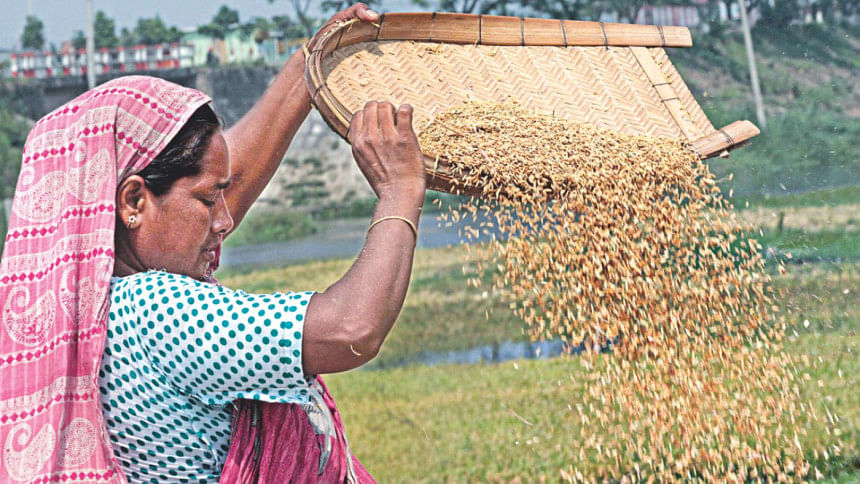Private players betting on modern rice seeds

Private companies are gearing up to develop modern rice seeds after the government lifted restriction on carrying out research to introduce inbred varieties of the staple to cater to the Tk 1,000 crore market.
Companies such as ACI and Supreme Seed are at the forefront of developing improved seeds of rice and other crops thanks to their own research and development capacities, said officials of the companies recently.
“We see a very good prospect in the seed market, particularly in the inbred segment as the market size is quite big,” said FH Ansarey, managing director and chief executive of ACI's agribusinesses.
Until recently, private seed companies were not allowed to develop inbred or high-yielding varieties of rice. The restriction was also applied to wheat, potato, jute and sugar crops.
The control has been removed in the Seed Act, which was passed earlier this year.
The private sector got the scope to develop inbred seeds of crops nearly two decades after the government had allowed them to market and develop hybrid rice seeds in order to increase overall production to feed the growing population in the face of falling farm land.
However, hybrid rice failed to win the hearts of farmers and its coverage has remained confined to 7-8 lakh hectares, which is about 15 percent of the total boro rice area and about 7 percent of the total annual rice area, according to the ministry of agriculture.
High-yielding varieties (HYVs) or inbred varieties account for nearly 80 percent of the total annual rice acreage.
Industry insiders said the annual rice seed market is about Tk 1,000 crore and HYVs' share would be two-thirds of the total market, which was estimated to be 2.74 lakh tonnes in 2016-17.
The organised sector, including state-run Bangladesh Agricultural Development Corporation (BADC), can cater to 57 percent of the total requirement of rice. And of the organised seed suppliers, BADC dominates the market.
Industry operators said the scope to develop inbred rice seeds will help the private sector secure a bigger share of the market.
ACI, in collaboration with Rajshahi University (RU) and Bangladesh Agricultural University (BAU), has already developed two inbred varieties of rice, Ansarey said.
One of the varieties has been developed for the aman season that begins in June and ends in December.
BAU developed the second variety for the boro season that spans from November to May. Both new varieties have higher yield than the popular varieties BR-11 and BRRI Dhan 28, Ansarey said.
ACI hopes to get approval from the National Seed Board (NSB) for the two modern varieties in 2019 and 2020, he said, adding that the Rabi Dhan-1 developed for the aman season would come first.
Both varieties are now under trial, according to Ansarey.
ACI has developed the R&D capacity with support from the International Rice Research Institute.
“We are doing focused and targeted research,” he added.
The big market size is the main attraction behind the private sector's interest in developing inbred rice varieties, said Mohammad Masum, chairman of Supreme Seed Company.
“So far we are multiplying HYVs developed by the Bangladesh Rice Research Institute. We will now be able to develop modern rice varieties on our own and take them to the doorsteps of farmers along with the varieties developed by the BRRI.”
This will create a healthy competition in the market, he said.
Supreme Seed Company has been doing R&D for the last several years on inbred rice, expecting that the government would open the field.
The company has three modern varieties in the pipeline that would be ready to market by 2021, Masum added.
The entry of the private sector in developing modern rice will enhance competition, said Md Azim Uddin, chief seed technologist at the seed wing of the ministry of agriculture.
This will have a long-term positive impact on the seed sector owing to competition between the public and private sectors in case of R&D on seeds.
Farmers will get better seeds in terms of yields, resistance and taste. “In short, they will get diversified seed,” said Azim.
The seed wing has already drafted rules under the new seed law and sat with stakeholders to get their opinion before finalisation.
“We want to frame the rules within this year,” Azim added.
A senior official of the Seed Certification Agency stressed on proper and transparent evaluation by the NSB before the release of any new variety to farmers.

 For all latest news, follow The Daily Star's Google News channel.
For all latest news, follow The Daily Star's Google News channel. 



Comments